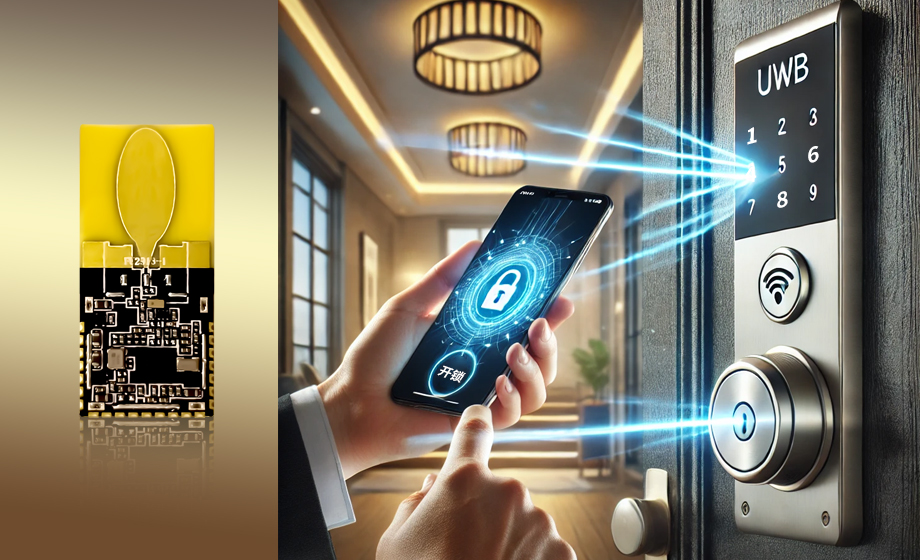With the rapid development of Internet of Things (IoT) technology, indoor positioning technology has gradually become the focus of attention in various industries. Ultra-Wideband (UWB) technology has shown great potential in the field of indoor wireless positioning with its advantages of high precision, high speed and low power consumption. This paper will deeply discuss the technical characteristics, application scenarios, development prospects, and advantages and challenges of UWB indoor wireless positioning chips in the current market environment.

I. Overview of UWB technology
Ultra-wideband technology is a carrier-less communication technology that transmits data using non-sine-wave narrow pulses from nanoseconds to microseconds. The core of UWB technology is its ultra-wide spectrum, capable of supporting data transfer rates of up to several gigabits per second (Gbps), and achieving centimeter-level positioning accuracy over short distances. This technology is particularly suitable for indoor environments, where there are often problems such as multipath effects and signal attenuation, and UWB technology, with its high bandwidth and low power characteristics, can provide stable and reliable positioning services in complex environments.
Second, the technical characteristics of UWB indoor wireless positioning chip
High-precision positioning: UWB technology uses the Time of Flight (TOF) ranging principle, by measuring the transmission time of the signal from the transmitting end to the receiving end, combined with the known signal propagation speed, the distance between two points can be calculated. Due to the short pulse width and high time resolution of the UWB signal, centimeter-level positioning accuracy can be achieved.
High speed transmission: UWB technology has a data transmission rate of up to several Gbps, which enables the UWB positioning chip to complete the transmission and processing of a large amount of data in a short time, improving the response speed and real-time performance of the system.
Low power design: The UWB positioning chip adopts low power design, which can ensure the positioning accuracy, reduce the system energy consumption, and extend the service life of the device. This is critical for indoor positioning applications that require long periods of operation.
Strong anti-interference: UWB signal adopts spread spectrum communication technology, which has high anti-interference. In the complex indoor environment, the UWB positioning chip can effectively resist the influence of multi-path effect, signal attenuation and noise interference, and ensure the stability and reliability of positioning.
Third, the application scenario of UWB indoor wireless positioning chip
Smart home: In the field of smart home, UWB indoor wireless positioning chip can be used to achieve accurate positioning and control of furniture, home appliances and other devices. By combining smart devices such as sensors and controllers, the automation and intelligent management of smart home systems can be achieved to improve the quality of life.
Warehousing and logistics: In the field of warehousing and logistics, UWB indoor wireless positioning chips can be used to achieve accurate positioning and tracking of goods. By monitoring the location and status of goods in real time, the efficiency and accuracy of warehouse management can be improved, and operating costs can be reduced.
Industrial automation: In the field of industrial automation, UWB indoor wireless positioning chips can be used to achieve accurate positioning and control of robots, automation equipment and other equipment. By accurately mastering the location and movement trajectory of the equipment, the automatic management and optimization of the production line can be realized, and the production efficiency and product quality can be improved.
Fourth, the development prospects of ultra-wideband UWB indoor wireless positioning chips
With the continuous development and popularization of Internet of Things technology, the demand for indoor positioning technology will be more and more large. UWB indoor wireless positioning chip with its high precision, high speed, low power and other advantages, will occupy an important position in the future market. At the same time, with the continuous development of 5G, AI and other technologies, UWB indoor wireless positioning chips will be combined with these technologies to achieve more intelligent and efficient applications.
However, UWB indoor wireless positioning chips also face some challenges. First of all, the popularity of UWB technology is relatively low, and more marketing and publicity are needed. Secondly, the cost of UWB positioning chips is relatively high, and manufacturing costs need to be further reduced to meet the needs of more application scenarios. UWB positioning chips need to be effectively integrated and integrated with other technologies and devices to achieve a wider range of applications.
V. Summary and outlook
As a new technology product, UWB indoor wireless positioning chip has the advantages of high precision, high speed and low power consumption, and has shown great potential in the field of indoor positioning. With the continuous development and popularization of Internet of Things technology, UWB indoor wireless positioning chips will play an increasingly important role in smart home, warehousing and logistics, industrial automation, medical health and other fields. At the same time, we also need to pay attention to the challenges and limitations of UWB technology, and promote the popularity and application of UWB indoor wireless positioning chips through technological innovation and marketing. In the future, we have reason to believe that UWB indoor wireless positioning chips will bring us a more intelligent and efficient life and work experience.



